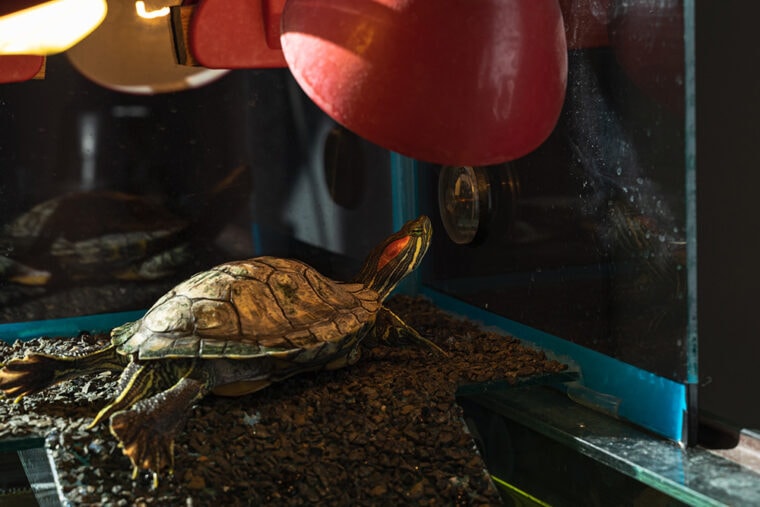
If you have a pet turtle, you will need to provide them with an environment suitable to their needs. This includes an enclosure with enough space for them to move around, land and water access (depending on their species), places for them to hide, and the correct amount of heat and light.
It can be confusing to figure out how much heat and light is appropriate for your turtle. Many turtle owners wonder if they need to keep the light on in their turtle’s tank at night. Luckily, the answer is no. Your turtle will be just fine if the light is turned off during night time hours. It is actually recommended that they are exposed to a natural amount of light and darkness each day. Let’s dig into the details.

What Are Your Turtle’s Light and Temperature Needs?
Turtles are reptiles, which means they are cold-blooded. They are unable to regulate their internal body temperature. They need heat from an outside source to stay warm. If your pet turtle is kept indoors, as most young or small pet turtles are, you will need to provide them with a source of heat and light.
While all species of turtles will have different heat and light requirements, individual species can be researched to know their temperature requirements. For example, if you have red-eared sliders, their tank should be maintained between 22–27 °C (72–81 °F). The temperature of their basking spot should be approximately 32 °C (around 90 °F), whereas nighttime temperatures should not fall below 17 °C (63 °F).
Turtles also need a light source throughout the day. It is best to mimic the natural pattern of light and dark in your turtle’s tank. Therefore, having approximately 12 hours each of light and darkness each day should be sufficient. Turning your turtle’s tank light off at night will give them the proper balance of light and temperature control.

What Kind of Light Does Your Turtle Need?
Your turtle needs UV light to closely mimic the quality of light it would get from the sun in the wild. They need a UV lamp specifically made for reptiles. This light should provide them with both UVA and UVB rays.

Why Does Your Turtle Need UVA and UVB Light?
Turtles need both UVA and UVB light to be healthy. UVA light provides them with warmth and the comfort of sunlight. They need to maintain the correct body temperature to regulate their metabolism, breed, and support their immune system.
UVB light is also critical for a turtle’s health and wellbeing. They need UVB light to produce vitamin D3. This vitamin is necessary for turtles to metabolize calcium. Without it, their shells and bones will not grow properly. Without enough UVB light, turtles may suffer from metabolic bone disease. Turtles also need the correct heat and UV to properly digest their food.
In outdoor enclosures (such as a pond), lighting isn’t required, as turtles have access to sunlight. It is recommended to allow your turtles access to a secure outdoor enclosure for at least part of their year (the summer months). If you live in an area that is tropical all year long, they can be housed outdoors in a secure enclosure year-round.

Some UVB Light Tips
There are a few important things you need to know about buying a UVB light for your turtle’s tank. These include the following:

Final Thoughts
There are many things to worry about when you have a pet turtle, but keeping the heat lamp on overnight is not one of them. They will get enough heat and light during the daytime if you have the proper bulbs and lighting in the tank.
Featured Image Credit: Liubov Sydorenko, Shutterstock








